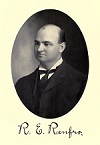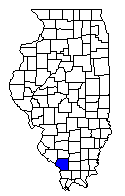
 ROBERT
EAGLE RENFRO. The rapid progress and development of Southern Illinois has
made the real estate trade active and extensive for many years, given the
loan business great opportunities and kept the fire insurance companies in
very active and profitable operation. These conditions have also furnished
many men with business and employment, and been, as they always are, of
great benefit and service to the region in which they have obtained.
ROBERT
EAGLE RENFRO. The rapid progress and development of Southern Illinois has
made the real estate trade active and extensive for many years, given the
loan business great opportunities and kept the fire insurance companies in
very active and profitable operation. These conditions have also furnished
many men with business and employment, and been, as they always are, of
great benefit and service to the region in which they have obtained.
One of the most energetic, enterprising and successful men engaged in the
triple business specified, in Carbondale is Robert E. Renfro, who has been
occupied in these lines of endeavor since 1893, and in the course of his
activity in them has been of great service in stimulating the growth and
development of all Southern Illinois, throughout which his operations have
been conducted in a manner very creditable and profitable to him and
satisfactory to all with whom he has had dealings. Mr. Renfro was born in
Elizabethtown, Hardin county, Illinois, on May 25, 1873, and is a son of the
late John H. B. and Emeretta Leona (McClellan) Renfro, prominent citizens of
that county, the story of whose lives is briefly told in this work. The
father, as will be seen by reference to the sketch of him, was treasurer of
Hardin county four years and county clerk there seventeen years. He was
afterwards a lawyer and pension attorney until his death, in October, 1908.
His son Robert E. began his education in the public schools and complete
it at the Southern Illinois Normal university, from which he was graduated
in 1893. After his graduation he began his career in business in the
department of real estate, loans and fire insurance. He has found the
business so congenial, and has made it so profitable, that he has continued
his connection with it and steadily enlarged his operations ever since. As
has been stated, his dealings now extend all over Southern Illinois, and
often involve transactions of considerable magnitude. He is regarded as
master of his line of endeavor, and no one questions the excellence or
accuracy of his judgment in reference to the value of real estate or the
future possibilities of any tract under improvement.
The public
affairs of his city have also deeply interested Mr. Renfro, and made him an
advocate of the highest moral tone attainable in the government of the city.
On a recent occasion he was the candidate of the anti-saloon party for
mayor, but the hour was not ripe for the conditions he and that party
advocated, and he was defeated at the election. This did not dampen his
ardor for good government, however, and he has ever since kept up his demand
for it and for every other form of improvement.
The nature of his
business makes him energetic and effective in promoting the extension and
growth of the city and the development and betterment of every locality in
which he operates. But this only quickens and intensifies a disposition that
exists in his very character and make-up as a man and citizen. For he is in
all things essentially and practically progressive by nature. In fraternal
relations he has active membership in two of the benevolent societies so
numerous among men, the Order of Elks and the Knights of Pythias. In
political matters he is an unwavering Republican in national contests, but
has never been desirous of a political office except the local one mentioned
above, and this his friends induced him to seek for the good of the city.
His religious connection is with the Methodist Episcopal church, in the work
of which he is very active and energetic, being a member of the official
board of the congregation which has the benefit of his serviceable
membership.
On Sept. 4, 1895, Mr. Renfro was joined in marriage with
Miss Beulah Witt Storm, a daughter of Oliver P. and Emma H. (Haley) Storm,
of Jonesboro, Illinois, where her father was a merchant at the time of his
death, in 1888, and for many years prior to that. She and her husband have
two children, their sons Donald McClelland and Robert Kennon, who are still
bright links that bind the whole family into one of the most agreeable
family circles in the city of their home, and help to make the household one
of its most attractive and popular social resorts.
Extracted 15 Jan 2018 by Norma Hass from 1912 A History of Southern Illinois, volume 2, pages 705-706.
Randolph |
Perry | Franklin |
Perry MO |
 |
Williamson |
| Union |


